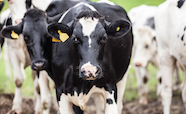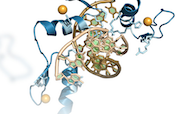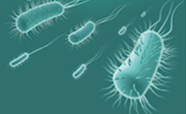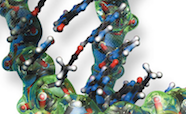Agriculture at Otago
 Enhancing agricultural productivity is one of our three research planks that underpins the challenges for NZ's Primary Sector as a global producer of sustainable high value food products.
Enhancing agricultural productivity is one of our three research planks that underpins the challenges for NZ's Primary Sector as a global producer of sustainable high value food products.
Agricultural productivity can be significantly enhanced through reducing the impact of plant and animal pests and diseases, and by developing improved breeds of plants and animals.
This research is focused on developing new and / or improved strategies to diagnose and treat disease. Understanding the mechanisms of resistance and susceptibility to diseases, such as tuberculosis, has been a long-term focus of research at Otago and we also have expertise in plant diseases.
To reduce the impact plant pests and animal parasites have on productivity, we are developing pesticides with reduced off-target effects, and novel biocontrol strategies to control pasture pests.
Breeding strategies are being revolutionised through new molecular-genetic approaches. We have strong basic biomedical and plant research that provides extensive expertise in discovering the molecular basis of agriculturally important traits, such as animal fertility and plant flowering. This knowledge is crucial for the efficient incorporation of such traits in modern breeding programmes.
Email ag@otago.ac.nz
Web otago.ac.nz/agriculture
Centre for Animal Health Formulation
 The Centre, located at the School of Pharmacy, focuses on the development, optimization, and delivery of pharmaceuticals and other health-related products for animals. Leveraging access to cutting-edge pharmaceutical scientists, technology, and equipment, it produces novel animal health products.
The Centre, located at the School of Pharmacy, focuses on the development, optimization, and delivery of pharmaceuticals and other health-related products for animals. Leveraging access to cutting-edge pharmaceutical scientists, technology, and equipment, it produces novel animal health products.
The Centre has established collaborations with specialists including animal scientists, veterinarians, pharmacists, and other industry experts. As a result, several cutting-edge treatments have been introduced into the market and protected by filed patents. This multidisciplinary approach ensures the creation of innovative and effective animal health solutions.
Email greg.walker@otago.ac.nz
Web otago.ac.nz/animal-health-formulation
Department of Biochemistry

Our research groups use a variety of approaches to understand how disease occurs, including molecular genetics and bioinformatics, protein structural biology and cell biology techniques.
We study the infectious agents behind a range of diseases:
- Professor Kurt Krause - The structural biology of infectious diseases, particularly targets from Mycobacterium tuberculosis, including enzymes involved in bacterial cell wall synthesis, like alanine racemase and glutamate racemase, and from poxviruses including immunomodulating factors such as chemokine binding proteins
- Professor Iain Lamont - Pseudomonas aeruginosa bacteria, which cause lung infections in patients with cystic fibrosis
- Dr Chris Brown - viruses including hepatitis B
Please visit the Department of Biochemistry's research pages to find out more:
Biochemistry research at Otago: Genetic and molecular basis of disease
Our staff also belong to wider topic-based research centres and themes in the University.
- Agriculture at Otago
- Genetics Otago
- Genomics Aotearoa
- Otago Global Health Institute
- Webster Centre for Infectious Diseases
Email biochemistry@otago.ac.nz
Web otago.ac.nz/biochemistry/research
Department of Microbiology and Immunology
 Please visit our Research Overview page for the specific research interests and expertise of our staff who work in the disciplines listed.
Please visit our Research Overview page for the specific research interests and expertise of our staff who work in the disciplines listed.
Immunology
Our department hosts a community of research groups involved in the study of a wide range of topics, from fundamental immunology and applied research on clinical and veterinary biomarkers through to vaccine development. Our research staff and students are experts in immunology, cell biology, blood and lymphatic systems.
Infectious disease-related work:
Microbiology
Our internationally recognized researchers and their teams are investigating areas central to microbiology, both fundamental and applied. Diverse techniques spanning genetics, molecular biology and biochemistry are used to understand the environmental role of microbes, host-microbe interactions that underpin both beneficial and disease processes in plants and animals, and to develop new biotechnologies.
Infectious disease-related work:
Parasitology
Our laboratory focuses on the biology of the parasite Plasmodium vivax (the cause of vivax malaria) and how we can kill it using therapeutics or vaccinations. In addition to vivax malaria we also investigate the biology and epidemiology of protozoal parasites of importance to human health in New Zealand.
Virology
We have a vibrant virology community undertaking both basic and applied virology. Understanding virus-host interactions, engineering vaccines, the discovery of virus-derived bioactive molecules and identification of targets for antivirals are all key research areas. Our successful and active virology groups are supported by a collegial approach to research that benefits both staff and students.
Infectious-disease-related research collaborations
Research staff of the department collaborate with many other University of Otago researchers in the form of research themes or centres:
- Agriculture at Otago
- Genetics Otago
- Otago Global Health Institute
- Webster Centre for Infectious Disease
Email microbiology@otago.ac.nz
Web micro.otago.ac.nz/research/research-overview/
Department of Pathology and Biomedical Science
 The Department undertakes internationally-renowned research in pathology and biomedical science. This underpins the teaching of postgraduate research students and undergraduate medical students at the University of Otago, Christchurch campus.
The Department undertakes internationally-renowned research in pathology and biomedical science. This underpins the teaching of postgraduate research students and undergraduate medical students at the University of Otago, Christchurch campus.
Zoonotic disease transmission
Around 60% of microorganisms causing human disease are passed between animals and humans ("zoonotic" pathogens). Changing farming practices in New Zealand are creating conditions promoting pathogen transfer between species.
Dr Pippa Scott's HRC project aims to identify interventions to control transmission to humans. Two zoonotic bacteria will be examined: Shiga-toxin producing Escherichia coli (STEC) and Staphylococcus aureus. STEC causes severe diarrhoea, while S. aureus causes serious skin and bloodstream infections.
Email pippa.scott@otago.ac.nz
Department of Pharmacology and Toxicology
 State-of-the-art technologies, including the use of in-vivo disease models, are used to undertake integrative, cellular and molecular investigations aimed at understanding animal and human pathophysiology (and to delineate targets for novel drugs).
State-of-the-art technologies, including the use of in-vivo disease models, are used to undertake integrative, cellular and molecular investigations aimed at understanding animal and human pathophysiology (and to delineate targets for novel drugs).
Wound healing and virology
Associate Professor Lyn Wise trained as a molecular virologist and was a key researcher in the functional characterisation of the viral family of vascular endothelial growth factors and a range of anti-inflammatory factors encoded by the parapoxviruses.
Her research currently focuses on microbial manipulation of the inflammatory, vascular and wound healing responses in the skin, and the use of bio-therapeutics for skin wounds, infections and inflammatory disorders.
Email lyn.wise@otago.ac.nz
Web otago.ac.nz/phal/people/profile?id=307
Disease Research Limited
 As a diagnostic laboratory DRL have worked closely with New Zealand vets and farmers for the past 30 years to develop and make available custom diagnostic services to better meet their needs.
As a diagnostic laboratory DRL have worked closely with New Zealand vets and farmers for the past 30 years to develop and make available custom diagnostic services to better meet their needs.
In addition to routine testing capability for Johne's disease in deer, cattle, sheep and goats from serum, milk and dung samples, DRL also provide testing services for BVDV (cattle) and CAE (goats) and are partnered with CRV Ambreed as their preferred herd testing diagnostic laboratory.
DRL have always been actively engaged in research activities relative to animal health in NZ and in the translation of their laboratory findings into practical and usable frontline diagnostic tools. In 2016, DRL transitioned from a university-administered laboratory service into an independent agri-enterprise under the management of Otago Innovation Limited based at the Invermay Agricultural Centre based in Mosgiel just outside of Dunedin.
DRL was originally Deer Research Laboratory, subsequently Disease Research Laboratory, and more recently reborn as Disease Research Limited. It was established by Professor Frank Griffin in 1985 within the Department of Microbiology and Immunology at the University of Otago.
Email drl@drl.net.nz
Web www.drl.net.nz
DRL - Diesease Research Limited
Genetics Otago
 Genetics Otago is the largest centre for advanced genetics research in Australasia, with researchers and facilities covering the full spectrum of genetics research. In relation to infectious diseases our research includes:
Genetics Otago is the largest centre for advanced genetics research in Australasia, with researchers and facilities covering the full spectrum of genetics research. In relation to infectious diseases our research includes:
- Applied genetics research
Our researchers are at the forefront of selecting and producing new traits for biologically-based industries. These industries are the backbone of the New Zealand economy. - Developmental genetics research
We study genes and development in numerous vertebrates and invertebrates. We work to identify genes associated with human developmental disease, and on epigenetics, and human and plant biology. - Microbial research
Our researchers study the biology of these organisms, including how viruses interact with other organisms and the immune system, and how they might be harnessed to deliver health benefits.
Email go@otago.ac.nz
Web https://www.otago.ac.nz/genetics/nz/
Genomics Aotearoa
 Genomics Aotearoa is an agile, leading-edge and collaborative platform, established to ensure that New Zealand is internationally participating and leading in the rapidly developing fields of genomics (the study of the genome, the complete set of genetic material present in a cell or organism) and bioinformatics (the development of methods and software tools for understanding the biological data derived from genomics).
Genomics Aotearoa is an agile, leading-edge and collaborative platform, established to ensure that New Zealand is internationally participating and leading in the rapidly developing fields of genomics (the study of the genome, the complete set of genetic material present in a cell or organism) and bioinformatics (the development of methods and software tools for understanding the biological data derived from genomics).
Genomics Aotearoa is an alliance of ten partners:
- Universities - Auckland, Massey, Otago, Victoria, Waikato
- Crown Research Institutes - AgResearch, ESR, Landcare Research, Plant & Food, Scion
It also has over 30 associates - organisations that are researchers or end users of genomics and bioinformatics.
Email genomics.aotearoa@otago.ac.nz
Web www.genomics-aotearoa.org.nz
Health, Environment and Infection Research Unit (HEIRU)

The Health, Environment and Infection Research Unit (HEIRU) is a collaboration of researchers focused on the impact of infectious diseases and adverse environmental factors on population health.
We use a range of research methods to investigate these health concerns; to identify effective interventions to reduce the burden of disease and inequalities; and to support the move to greater environmental sustainability.
HEIRU aims to provide evidence-based recommendations and advice to support New Zealand and international agencies and practitioners in their disease prevention and control activities.
Our research includes:
- Impact and distribution of infectious disease in New Zealand
- Campylobacter epidemiology and impact
- Risk factors for Rheumatic Fever (case-control study)
- BLIS trial for rheumatic fever prevention (with Julian Crane)
- Evaluation of the Rheumatic Fever Prevention Programme (with ESR)
- Coalition to Advance New Vaccines for Group A Streptococcus (CANVAS) (with Telethon Kids Institute and University of Auckland)
- Southern Hemisphere Influenza and Vaccine Effectiveness, Research and Surveillance (SHIVERS) (with ESR)
- Clioepidemiology of pandemic influenza: ongoing projects studying the experience of pandemic influenza in 1918.
- Health effects of household crowding (with Housing and Health Research Programme)
- Integrated Systems for Epidemic Response (ISER) (with University of NSW, Australia)
Email michael.baker@otago.ac.nz
Web otago.ac.nz/wellington/departments/publichealth/research/heiru/
One Health Aotearoa
 One Health Aotearoa is an alliance of New Zealand's leading infectious diseases researchers committed to working together to address important health hazards in New Zealand, and beyond.
One Health Aotearoa is an alliance of New Zealand's leading infectious diseases researchers committed to working together to address important health hazards in New Zealand, and beyond.
A key lesson from recent infectious diseases outbreaks, including Ebola in West Africa, and efforts to control antimicrobial resistance, is that now, more than ever, we need to work across sectors, and reverse the trend towards increasing compartmentalization. Importantly, issues are addressed in a real-world context, with early involvement of key stakeholders and easier translation into policy.
Visit our website for more about our integrative approach to understanding, preventing, and controlling infectious diseases including:
Email: one.health@otago.ac.nz
Web: onehealth.org.nz
Otago Genomics Facility
 We provide expertise and sequencing resources to New Zealand researchers and industry including:
We provide expertise and sequencing resources to New Zealand researchers and industry including:
- Project design and advice
- Illumina HiSeq sequencing
- Illumina MiSeq sequencing
- Nanostring nCounter Analysis System
The Otago Genomics Facility is an Illumina Propel-certified service provider for Illumina HiSeq 2500 and MiSeq sequencing platforms, and is also a Nanostring nCounter Analysis System core facility.
Email genomics@otago.ac.nz
Web otago.ac.nz/genomics
Otago Global Health Institute (OGHI)
 We aim to improve global health and save lives, by identifying and evaluating solutions to important health problems in low-resource settings.
We aim to improve global health and save lives, by identifying and evaluating solutions to important health problems in low-resource settings.
We work to address the world's most pressing health problems through research collaborations with low- and middle-income countries, and with disadvantaged groups in New Zealand.
We draw upon New Zealand's unique connections with Asia and the Pacific. Our extensive international partnerships and cross-disciplinary collaborations enable us to carry out innovative and rigorous research to advance global health.
Visit OGHI Selected projects to read more about:
- Bill & Melinda Gates Foundation: Invasive Salmonella infections in Africa.
- UK Biotechnology and Biological Sciences Research Council: The impact and social ecology of bacterial zoonoses in northern Tanzania.
- UK Biotechnology and Biological Sciences Research Council: Hazards Associated with Zoonotic enteric pathogens in Emerging Livestock meat pathways (HAZEL).
- UK Biotechnology and Biological Sciences Research Council: Social, Economic and Environmental Drivers of Zoonoses in Tanzania (SEEDZ).
- UK Biotechnology and Biological Sciences Research Council: Molecular epidemiology of brucellosis in northern Tanzania.
- US National Institutes of Health: Investigating Febrile Deaths in Tanzania (INDITe).
- US National Institutes of Health: The impact and social ecology of bacterial zoonoses in northern Tanzania.
Email globalhealth@otago.ac.nz
Web otago.ac.nz/global-health
Otago Micro and Nanoscale Imaging (OMNI)
 Four well-established and highly respected research-expertise providers have joined together under one umbrella to offer:
Four well-established and highly respected research-expertise providers have joined together under one umbrella to offer:
All the expertise, highly sophisticated instrumentation, and stellar support remains in place, as do the existing locations of services on our Dunedin campus.
The four units have collaborated on a new website as a central repository of their capabilities and achievements.
For all you need to know about what can be offered, who can help, what services, training, and specialist expertise and advice is available, please contact us.
Email omni@otago.ac.nz
Web otago.ac.nz/omni
Research Infrastructure Centre
 Our Research Infrastructure Centre offers specialist expertise, technology and facilities in protein research, genomics, imaging, and biomedical research.
Our Research Infrastructure Centre offers specialist expertise, technology and facilities in protein research, genomics, imaging, and biomedical research.
We support optimum design and analysis of your research, and provide skill development opportunities.
Our academic leadership is of the highest calibre and we have extensively experienced and skilled staff.
Our services are available to researchers in institutions, industry, government and private companies.
Email ric.admin@otago.ac.nz
Web otago.ac.nz/healthsciences/research/ric
School of Pharmacy
 The School of Pharmacy has a very active research programme with disciplines ranging from science to humanities with each having a strong contextual link to health sciences.
The School of Pharmacy has a very active research programme with disciplines ranging from science to humanities with each having a strong contextual link to health sciences.
Our research related to infectious diseases is listed under our three main research areas:
Clinical Pharmacy (optimal use of medicines)
- Professor Carlo Marra: Health assessment for people with HIV/AIDS in Kenya
Pharmaceutical Sciences (quality of medicines)
- Dr Shyamal Das: Respiratory drug delivery
- Dr Allan Gamble: Design and synthesis of biologically-active molecules
- Professor Sarah Hook: Development and application of novel therapeutic and prophylactic vaccines
- Associate Professor Arlene McDowell: Veterinary formulations
- Professor Ian Tucker: Drug formulation and delivery for human and veterinary applications
- Professor Joel Tyndall: Drug design and discovery
Social Pharmacy (Access to medicines)
- Dr Susan Heydon: Global vaccination programmes
Research groups and collaborations with relevance to infectious disease:
Email pharmacy.research@otago.ac.nz
Web otago.ac.nz/pharmacy/research
Webster Centre for Infectious Diseases
 Our scope extends from molecular to clinical research of infectious diseases affecting humans, animals, and plants.
Our scope extends from molecular to clinical research of infectious diseases affecting humans, animals, and plants.
We have over forty experts from across the university making fundamental discoveries and translating these discoveries into practical applications against infectious diseases.
Members of the Webster Centre use a variety of methods in their research, ranging from chemistry, biochemistry, molecular biology, bioinformatics, immunology and microbiology.
Key research:
- Applied and molecular immunology
- Bacterial physiology and antimicrobial resistance
- Human virology: human papillomavirus
- Human virology: influenza virus
- Immunity to bacterial infection
- Oral microbiology and antifungal drug resistance
- Pseudomonas in kiwifruit
- Structural biology of infectious diseases
Email webstercentre@otago.ac.nz
Web otago.ac.nz/webster